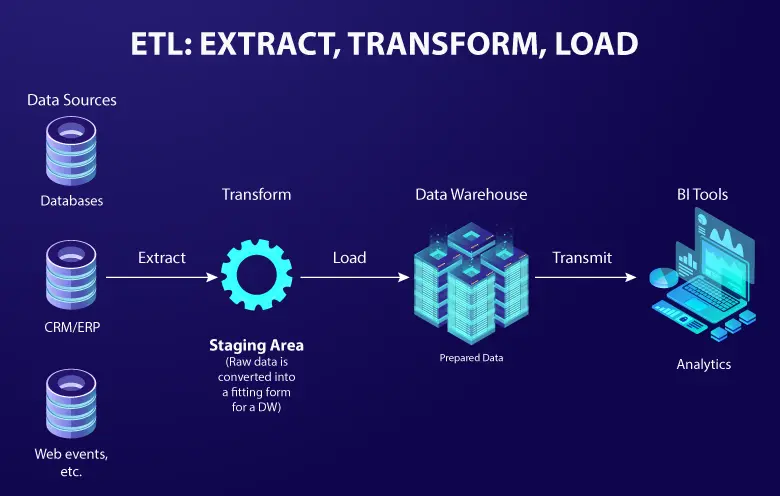In a world where data reigns supreme, businesses are faced with the daunting task of managing and making sense of the constant influx of information. Inaccurate insights hinder strategic decision-making and the risk of security breaches looms large. Without a solid data management strategy, organizations may find themselves adrift, unable to use the true potential of their data and at risk of falling behind in an increasingly competitive market.
Data management services emerge as the guiding light in this data-driven labyrinth. This blog embarks on a journey through the realm of data management services, exploring the critical components, unparalleled benefits, associated challenges, the art of choosing the right service provider and their practical real-world applications. Additionally, we’ll offer a glimpse into the future trends that promise to shape the data management landscape and conclude with invaluable tips to seamlessly implement these services in your organization.
Without much further ado, let’s understand data management services in detail.
Benefits of data management services
The benefits of data management extend far beyond the surface, making them indispensable in today’s business environment. Here, we delve deeper into the multifaceted benefits:
Enhanced data accuracy: Data management services serve as the guardians of data accuracy. They ensure that the information is up-to-date, consistent and reliable. When you have access to accurate data, the strategic decisions you make are inherently more reliable.
Operational efficiency: Efficient data management streamlines business operations. It minimizes data-related errors, reducing costly downtime and the need for corrective actions. With data at your fingertips, you can make rapid, informed decisions, fostering operational agility.
Cost savings: Implementing data management services translates into substantial cost savings. By mitigating data errors and optimizing data storage and processing, your organization can reduce operational expenses. This not only benefits your bottom line but also allows you to allocate resources more strategically.
Data as a strategic asset: Proper data management transforms data into a strategic asset. Instead of being a burdensome resource, data becomes a valuable tool for driving innovation and growth. It propels businesses to the forefront of their industries.
Challenges in data management
Data management is not without its share of challenges. Understanding and addressing these hurdles is crucial to successfully harnessing the power of data management services:
Data volume handling: In the digital age, data is generated at an unprecedented pace. Organizations grapple with the sheer volume of data they collect, which can strain storage capacities and processing capabilities. Effective data management requires robust infrastructure and strategies to handle this ever-growing data load.
Data security: Data breaches and cybersecurity threats are pervasive. Organizations must ensure that sensitive data is rigorously protected from unauthorized access. Adhering to stringent security measures and compliance standards is vital to protecting sensitive information.
Regulatory compliance: Navigating the complex landscape of data regulations can be challenging. Different regions and industries have specific requirements for data handling, privacy and reporting. Staying compliant with these regulations demands constant vigilance and adaptation to evolving legal frameworks.
Choosing the right data management service provider
Selecting the right data management service provider is a critical decision that can significantly impact the success of your data management strategy. Here’s what you should consider:
Industry experience: Look for a service provider with a proven track record in your industry. Experience in your specific sector means they understand the nuances and challenges unique to your organization.
Scalability: Ensure that the chosen provider can scale its services to meet your evolving needs. As your organization grows, your data management requirements will change, so your provider should be flexible enough to accommodate this growth.
Data security expertise: Data security is paramount. Verify that your service provider has robust data security measures in place, including encryption, access controls and regular security audits. They should prioritize data protection and compliance.
Data integration capabilities: Data integration is a core component of data management. The provider should offer data warehouse solutions that enable seamless data integration from various sources, creating a unified view of your data.
Service customization: Your organization’s data management needs are unique. Your service provider should be able to customize their offerings to align with your specific requirements. Avoid one-size-fits-all solutions.
Future trends in data management services: Shaping tomorrow’s data landscape
1. AI and machine learning integration
- Embrace the transformative power of AI and ML for advanced data analysis.
- Leverage machine learning algorithms for predictive modeling and actionable insights.
- Explore AI-driven automation for enhanced data processing efficiency.
2. Data privacy and security
- Prioritize data privacy as a cornerstone of future data management practices.
- Implement robust security measures, including encryption and access controls.
- Stay abreast of evolving data regulations to ensure compliance and mitigate risks.
3. User-friendly tools development
- Anticipate the need for more intuitive and user-friendly data management interfaces.
- Invest in the development of tools that empower non-technical users to engage with data.
- Focus on accessibility to broaden the user base and enhance overall organizational efficiency.
Discover Snowflake, the forefront platform leading the evolution of data management services.
Snowflake: Revolutionizing data management for business
Focused on real-world business needs, Snowflake’s warehouse management architecture offers a robust response to the complexities associated with vast data volumes. Security isn’t just a feature; it’s a cornerstone for meeting the stringent demands of the contemporary business environment. From a practical business standpoint, Snowflake seamlessly integrates with AI and machine learning, introducing a new horizon of possibilities for advanced data analysis. What truly sets Snowflake apart is its business-centric approach—making data warehousing solutions for businesses not just powerful but also intuitive. Snowflake consulting services can redefine your business’s data strategy, opening doors to a future where data isn’t just managed; it’s strategically leveraged for growth and success.
Tips for implementing data management services in your organization
1. Needs assessment
- Conduct a comprehensive evaluation of your organization’s data requirements and challenges.
- Engage key stakeholders to ensure a holistic understanding of data needs across departments.
- Define clear objectives for data management services aligned with organizational goals.
2. Scalability planning
- Choose a data management solution with scalability at its core to accommodate growth.
- Consider future expansion and evolving data needs when selecting a service provider.
- Ensure that the chosen solution can flexibly adapt to changes in data volume and complexity.
3. Data security emphasis
- Make data security a top priority throughout the implementation process.
- Implement encryption, access controls and regular security audits to safeguard sensitive information.
- Develop and enforce data security policies and protocols within the organization.
4. Training investment
- Invest in comprehensive training programs to equip your team with the necessary skills.
- Provide ongoing education to keep the team abreast of the latest data management techniques.
- Foster a culture of continuous learning and improvement within the organization.
5. Continuous improvement
- Establish a feedback loop to regularly evaluate the effectiveness of data management processes.
- Encourage a culture of continuous improvement where feedback drives iterative enhancements.
- Stay responsive to changing organizational needs and emerging industry best practices.
The final say: Navigating the future of data management services
As we draw the curtains on our exploration of data management services, it’s evident that these are not mere tools but the shaping course of modern businesses.
As organizations embark on this journey, it’s not merely about managing data; it’s about unleashing its potential. By embracing evolving trends and implementing robust strategies, businesses can position themselves not just to survive but to thrive in an era where data isn’t a challenge but an opportunity to seize. The final say is clear – in the realm of data management services, the future is both the destination and the journey, offering possibilities for those ready to embrace its transformative power. And if you want to grab this opportunity to learn more about how to properly utilize data management services, then Softweb Solutions has got it covered for you. Drop us a line, and don’t hesitate to touch base with us.




